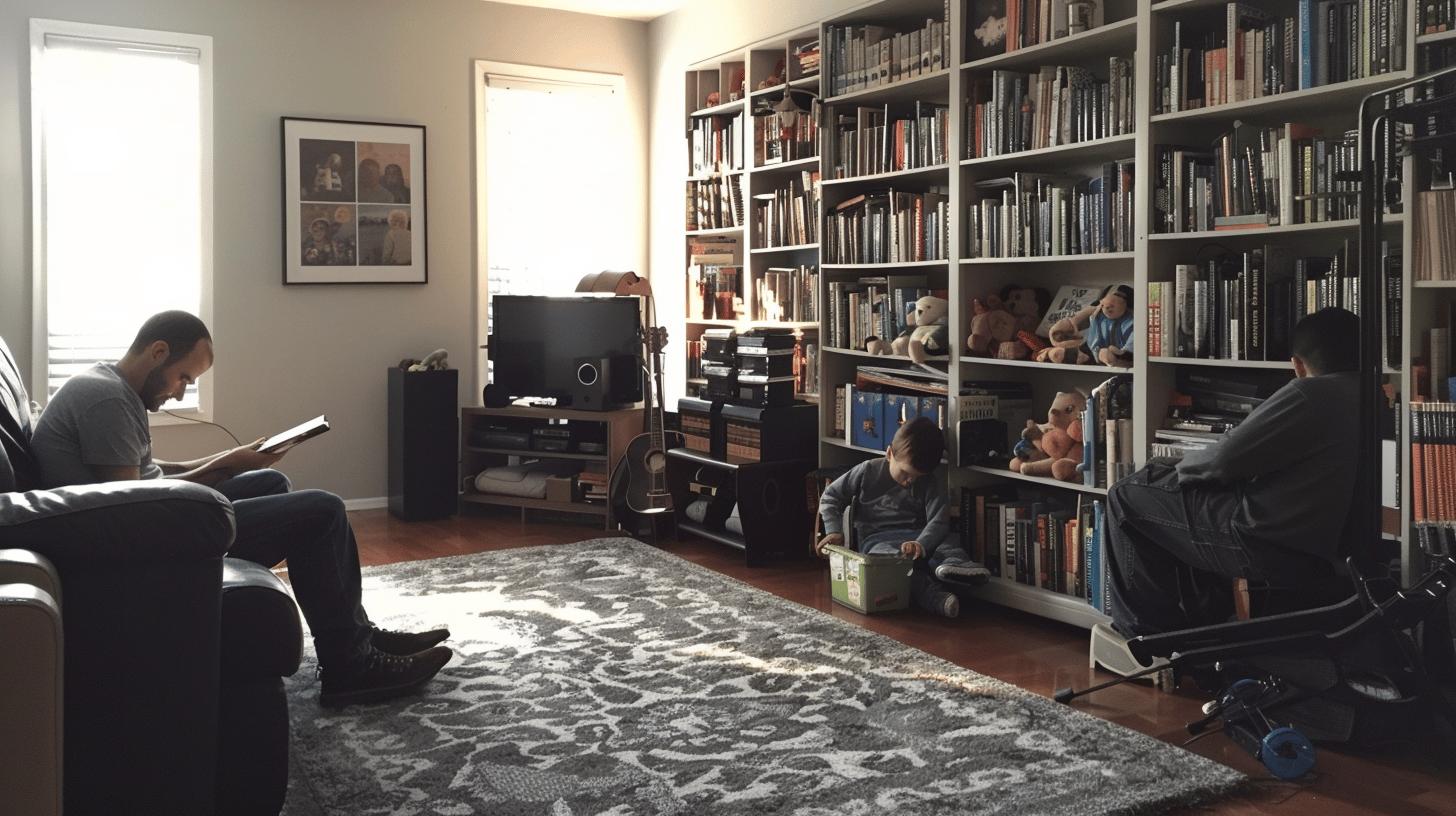Struggling to find ways to make your co-parenting journey smoother? You’re not alone. Whether you’re dealing with a cooperative ex or navigating a high-conflict relationship, the right book can provide invaluable guidance. In this article, we’ve compiled a list of top co-parenting books tailored to various situations, so you can find the advice that best fits your needs. With insights from experts in the field, these books will empower you to create a positive environment for your child, no matter the circumstances. Dive in and discover your next must-read.
Top Co-Parenting Books for Every Situation
Finding the right co-parenting book can make all the difference in navigating the complexities of raising children in separate households. Here are some of the top co-parenting books that cater to various situations:
-
"Mom’s House, Dad’s House: Making Two Homes for Your Child" by Isolina Ricci, Ph.D.
This book is a comprehensive guide for parents who are separated, divorced, or remarried. It provides practical advice on creating a stable and nurturing environment in both homes. The focus is on minimizing conflict and ensuring the child's well-being.
-
"Mindful Co-parenting: A Child-Friendly Path through Divorce" by Jeremy S. Gaies, Psy.D., and James B. Morris, Jr., Ph.D.
This book emphasizes the importance of mindfulness in co-parenting. It offers strategies for maintaining a calm and focused approach to parenting despite the emotional challenges of divorce. The goal is to prioritize the child's emotional health and stability.
-
"Co-Parenting 101: Helping Your Kids Thrive in Two Households after Divorce" by Deesha Philyaw and Michael D. Thomas
Written by co-parents who have successfully navigated the process, this book provides practical advice and real-life examples. It covers everything from communication tips to legal considerations, helping parents to work together for their children's benefit.
-
"Joint Custody with a Jerk: Raising a Child with an Uncooperative Ex" by Julie A. Ross, M.A., and Judy Corcoran
This book is tailored for parents dealing with a difficult ex-partner. It offers strategies for effective communication and conflict resolution, aiming to reduce stress and create a more cooperative co-parenting relationship.
For parents seeking guidance in specific co-parenting scenarios, these books offer valuable insights and practical advice.
Best Co-Parenting Books for Dads

Dads face unique challenges when it comes to co-parenting. Balancing work, maintaining strong connections with their children, and navigating complex emotions can be demanding. Here are some books specifically designed to help fathers succeed in their co-parenting journey:
- "The Single Father: A Dad's Guide to Parenting Without a Partner" by Armin A. Brott
Armin A. Brott provides practical advice tailored for single dads. This book covers everything from daily routines to navigating legal issues. It's a comprehensive guide that helps fathers understand their role and responsibilities, offering support to build a strong, healthy relationship with their children. - "Dad's Playbook to Labor and Birth: A Practical and Strategic Guide to Preparing for the Big Day" by Theresa Halvorsen and Brad Halvorsen
This book is a strategic guide for new dads preparing for the birth of their child. It provides essential tips on how to be supportive during labor and birth. With practical advice and real-life examples, it helps fathers feel confident and prepared for the big day.
Navigating High-Conflict Co-Parenting
High-conflict co-parenting presents unique challenges, often involving intense emotions, frequent disputes, and communication breakdowns. Successfully managing these situations requires targeted strategies and expert guidance.
-
"Joint Custody with a Jerk: Raising a Child with an Uncooperative Ex" by Julie A. Ross, M.A., and Judy Corcoran
This book is a lifesaver for parents dealing with a difficult ex-partner. It offers practical advice on communication techniques and conflict resolution strategies. The focus is on minimizing the impact of the conflict on the child while maintaining a cooperative co-parenting relationship. Techniques such as "active listening" and "I-messages" are emphasized to foster better communication.
-
"Divorce Poison: How to Protect Your Family from Bad-mouthing and Brainwashing" by Dr. Richard A. Warshak
Dr. Warshak's book addresses the damaging effects of parental alienation, where one parent attempts to turn the child against the other. It provides strategies to counteract bad-mouthing and brainwashing, ensuring that the child maintains a healthy relationship with both parents. The book also includes tips on how to communicate with children about the situation in a way that reassures them and reduces anxiety.
For parents navigating high-conflict co-parenting, these books offer invaluable insights and practical strategies to reduce stress and foster a healthier environment for their children.
Effective Co-Parenting After Divorce

Effective co-parenting after divorce is crucial for ensuring children's well-being and stability. It requires clear communication, mutual respect, and a focus on the child's best interests. Here are some of the best books to guide parents through this challenging period:
- "Co-Parenting 101: Helping Your Kids Thrive in Two Households after Divorce" by Deesha Philyaw and Michael D. Thomas
This book offers practical advice from co-parents who have successfully navigated divorce. It covers communication strategies, legal issues, and real-life examples. Key takeaways include methods to reduce conflict and tips for maintaining a positive co-parenting relationship. - "Parenting Apart: How Separated and Divorced Parents Can Raise Happy and Secure Kids" by Christina McGhee
Christina McGhee provides a comprehensive guide to raising children in separate households. The book focuses on creating a stable environment, addressing children's emotional needs, and managing logistics. Key takeaways include strategies for effective communication and tips for helping children adapt to new routines. - "Nolo's Essential Guide to Child Custody and Support" by Emily Doskow, Attorney
This legal guide offers a thorough overview of child custody and support issues. Written by an attorney, it includes information on legal rights, court processes, and financial considerations. Key takeaways include understanding legal terminology and navigating custody agreements effectively.
These books provide valuable insights and practical strategies for parents working to co-parent effectively after divorce.
Understanding Parallel Parenting
Parallel parenting is designed to minimize conflict by limiting direct communication between co-parents. This approach is particularly beneficial in high-conflict situations where traditional co-parenting may not be feasible. Parallel parenting allows each parent to make decisions independently while still maintaining a structured and supportive environment for the child.
Benefits of Parallel Parenting
- Reduces conflict: By minimizing direct communication, parallel parenting helps reduce the frequency and intensity of conflicts between parents.
- Creates stability: Consistent routines and clear boundaries provide a stable environment for the child.
- Fosters independence: Each parent can focus on their parenting responsibilities without interference from the other.
Recommended Books on Parallel Parenting
-
"Parallel Parenting: A Guide for Creating a Healthy Environment for Your Child"
This book offers comprehensive templates and strategies to implement parallel parenting effectively. It covers guidelines on setting boundaries, creating consistent routines, and managing communication through written methods. Key elements include detailed plans for conflict resolution and tips for maintaining a stable environment for the child.
-
"The Parallel Parenting Solution: How to Co-Parent Without Conflict"
This book provides practical advice for parents struggling with high-conflict situations. It focuses on techniques to reduce direct communication and offers solutions for common challenges in parallel parenting. Key elements include strategies for setting up a parallel parenting plan, managing transitions between households, and ensuring the child's well-being.
For parents seeking to minimize conflict and create a supportive environment, these resources offer invaluable guidance and practical strategies.
Co-Parenting Communication Tips from Experts

Effective communication is the cornerstone of successful co-parenting. Clear, respectful communication helps to minimize misunderstandings and create a stable environment for children. Expert advice can make a significant difference in navigating these conversations.
- "The Co-Parenting Handbook: Raising Well-Adjusted and Resilient Kids from Little Ones to Young Adults through Divorce or Separation" by Karen Bonnell and Kristin Little
This book offers practical strategies for maintaining healthy communication between co-parents. It emphasizes the importance of consistency and respect in interactions. Main strategies discussed include setting clear boundaries, using neutral tones, and focusing on the child's needs. The book also provides step-by-step guides for conflict resolution and effective problem-solving. - "Talking to Children About Divorce: A Parent's Guide to Healthy Communication at Each Stage of Divorce" by Jean McBride, M.S., LMFT
Jean McBride's guide focuses on age-appropriate communication strategies for discussing divorce with children. Key elements include understanding the emotional impact of divorce on children, providing reassurance, and maintaining open lines of communication. The book offers tips for addressing difficult topics and helping children express their feelings constructively.
These resources provide valuable insights and practical strategies for improving co-parenting communication, fostering a more harmonious environment for everyone involved.
Final Words
In the action, this article provided a comprehensive list of the top co-parenting books for various situations, covering essential topics like high-conflict scenarios and effective communication.
Each section offered expert recommendations, ensuring parents have the right resources to navigate their unique co-parenting challenges.
Whether dealing with a high-conflict ex or managing a divorce with grace, these co-parenting books offer valuable insights and practical advice.
By leveraging these resources, parents can foster a more harmonious environment, benefiting everyone involved.
Stay informed and empowered, knowing support is always at hand.
FAQ
Best Co-Parenting Books
Q: What are some of the best co-parenting books available?
A: Some of the top co-parenting books include:
- "Mom’s House, Dad’s House" by Isolina Ricci, Ph.D. – Offers strategies for creating a stable environment.
- "Mindful Co-parenting" by Jeremy S. Gaies, Psy.D. – Focuses on a child-friendly approach through divorce.
- "Co-Parenting 101" by Deesha Philyaw – Provides practical advice for thriving in two households.
- "Joint Custody with a Jerk" by Julie A. Ross, M.A. – Helps manage co-parenting with difficult exes.
Q: Are there specific co-parenting books for dads?
A: Yes, there are books tailored for fathers:
- "The Single Father" by Armin A. Brott – Practical advice for single dads.
- "Dad's Playbook to Labor and Birth" by Theresa Halvorsen – Strategic guide for new dads.
Co-Parenting with a Narcissist
Q: What are some books for co-parenting with a narcissist?
A: Recommended books include:
- "Joint Custody with a Jerk" by Julie A. Ross, M.A. – Strategies for dealing with uncooperative exes.
- "Divorce Poison" by Dr. Richard A. Warshak – Protects families from negative influences and manipulation.
Types and Challenges of Co-Parenting
Q: What are the 3 types of co-parenting?
A: The 3 types are:
- High-conflict co-parenting: Frequent disputes.
- Parallel parenting: Minimizes direct contact.
- Cooperative co-parenting: Mutual communication and collaboration.
Q: What is an example of failure to co-parent?
A: Failure can occur when parents refuse to communicate or consistently undermine each other’s parenting efforts, leading to confusion and instability for the child.
Effective Co-Parenting Tips
Q: What should you avoid when co-parenting?
A: Avoid bad-mouthing the other parent, inconsistent rules, and involving children in adult conflicts. Maintain respectful communication and focus on the child's best interest.
Q: What should you do if your ex refuses to co-parent?
A: Document all interactions, seek mediation or legal advice, and focus on creating a stable environment for your child.
Co-Parenting Communication Resources
Q: What are some expert-recommended co-parenting communication books?
A: Recommended books include:
- "The Co-Parenting Handbook" by Karen Bonnell – Guides effective communication and resilience development.
- "Talking to Children About Divorce" by Jean McBride – Offers healthy communication advice at each stage of divorce.


